
The following article by Charles Hartley was originally published on 23 May 2012. It was updated recently with additional information.
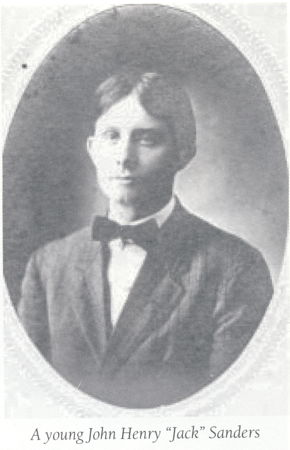
The lead paragraph in a 1941 newspaper article about Jack Sanders stated, "He SELLS education to the people and then helps them pay for it."
In a time when an eighth grade education was considered "good enough" for many folks, Professor John Henry "Jack" Sanders believed that every student should finish high school, and college if it could possibly be arranged. He believed that the main purpose of education was to develop good citizens.
He arrived in Shepherdsville in the Fall of 1912 with a dynamic personality and an ability to get things done, and it didn't take long before folks knew it.
Born in Campbellsville in 1881, Jack Sanders first taught at the Saloma Grade School near his home before he enrolled at Centre College at Danville in 1899. He married Maggie Baker in 1906 and over the years they reared six talented children.
Prior to coming to Shepherdsville, Jack Sanders was principal of the Campbellsville Grade School, and headed normal schools for teachers in Lebanon and Campbellsville. In those days many teachers began teaching without a college degree. They would improve their skills by attending sessions like the ones that Sanders provided. The purpose of these schools was to establish teaching standards or norms, hence the name, "Normal School." Jack Sanders continued to lead these classes for teachers for many years.
At Shepherdsville he was first hired to teach the 7th and 8th grade classes. The school, a red brick building built in 1905, then consisted of four rooms. J. T. Thompson was the school principal and taught the high school classes, Stella Troutwine taught the 4th, 5th and 6th grades, and Mary Hall taught the three lower grades.
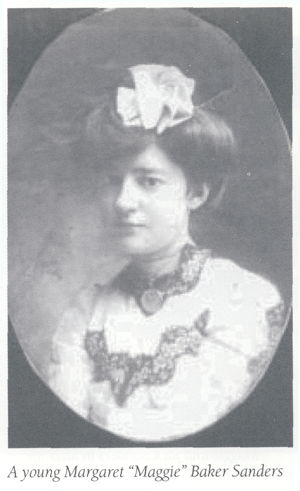
Within a year, Jack Sanders was the school's principal, and taught mathematics. Under his leadership, the school was remodeled, adding four classrooms, hallways, an office, laboratory space, and a library. It also included electric lights, a first for the school.
The school added basketball teams, both boys and girls, in 1914, and began presenting class plays in 1916. Sanders had a keen knack for knowing how to get the community involved.
In May 1916, the first Normal School in Shepherdsville under Sanders' leadership held its graduation. Graduates included attendees from Jefferson, Taylor, Hardin, Marion, Casey and Bullitt Counties. The local paper reported, "This Normal School does not only add to educational interests but it helps our town financially by bringing money to the town that would otherwise go elsewhere."
Many more words of praise would come Sanders' way in The Pioneer News over the years to come, as he raised educational standards in the community while participating fully in local activities.
In 1919, the paper wrote the following:
After a long but enjoyable vacation, our High School is in full swing once more with bright prospects of a very successful session. Prof. Jack Sanders is at the helm, which augurs well for the school, and he is fortified by and with one of the best balanced faculties we have seen since our High School was organized. Misses Mary Thompson, Pearl Hickerson, Martha Stevenson and Nadine Melton are new teachers in the school, while Misses Helen Burkholder and Birdie Manor have taught here before. Our school is the life of our town. It has done more for the town than any other institution in it. Prof. Sanders, the live wire who is at the helm, has done more good for the school than many realize.
Under his guidance and thru his begging and persuasion, the school room has grown from four rooms to eight rooms and a gym. He plans to make the school larger and better. The school is graded No. 1 and is in the same class with Owensboro and other cities. It is the only school in a town of our size which enjoys such distinction. Primarily and largely it is due to the good work and tireless energy of Prof. Sanders. And this man Sanders is not only a first class school man. In all the war work, he was out on the stump begging funds for the various organizations and preaching unadulterated Americanism to the boys and girls and men and women of Bullitt County. He is a high grade Christian gentleman and to such a man the fathers do not fear to send their children.
Education is the hope of every boy and girl in Bullitt County and the ambition of every parent is to educate the child - give him a better education than his parents received. The time has come when the boy or girl who would occupy high places must have a good education. The world demands it and those who ignore it must pay the penalty. Our people should rally around the school as one person. Let us do all in our power to make this the most successful session our school has ever enjoyed. Assist and encourage the teachers - pay your school taxes and do your part and we feel certain the teachers will do theirs. Here's a hearty welcome to all the teachers and with it the hope that they may spend a profitable and enjoyable session in our midst and do much that is good in their noble efforts.
Then, in January 1920, it announced, "The friends of Prof. J. H. Sanders, as a small token of their appreciation of his services to this town, school and community, gave him a handsome gold watch for his Christmas present."
In 1922, the paper printed these comments:
That the school is doing fine work, we have only to point to just a few boys and girl who have gone from this school to some of the best colleges in the country.
Chester Hardin went from here to the U. S. Naval Academy at Annapolis. John Glenn went to the University of Virginia; Samuel Ridgway to State College; Joseph Blankenship at Centre College; Misses Mary Stallings and Elizabeth Weller to State College; Muir Funk and Tom Trunnell to Georgetown and Robert Tyler to State College.
In order to enter the U. S. Naval Academy, students have to stand a most rigid examination and it was a great compliment to our school as well as to Chester Hardin that he was able to pass it. University of Virginia ranks just about as high as Yale and Harvard and Princeton, but John Glenn went right from our school to that great university showing that our school is doing a great work. Samuel Ridgway, Robert Tyler, the Misses Weller and Stallings of State, Trunnell and Funk at Georgetown and Blankenship at Centre, show that our school ranks with the best high schools in the whole country. There is one big reason and that reason is Jack Sanders and his splendid teachers. He knows where and when to get them and he does get them and they help him do the work.
What was our school when Sanders took charge of it? A wreck. What is it today? A great big success. How can we continue it as a success? Keep Jack Sanders. He will do the rest.
Both Jack and Maggie Sanders were talented musicians. Jack frequently sang and led the music at the Baptist Church, while Maggie's talents at the piano delighted everyone. As their children grew, music was a constant part of their lives.
Jack was involved in the local Masonic Lodge, and Maggie in the Eastern Star. She would become its highest officer in Kentucky in 1939.
One of the many highlights of Sanders' time in Shepherdsville occurred on September 28, 1923 when the community came together to discuss how to fund additional classroom space. Speaking earnestly to the crowd, Prof. Sanders convinced them that the best way to go was to build a new gymnasium and convert the space currently used for that purpose into additional classrooms.
The result was the Bullitt County Memorial Hall which was dedicated in October 1924. The community was justly proud of what they had accomplished and Sanders was given much of the credit.
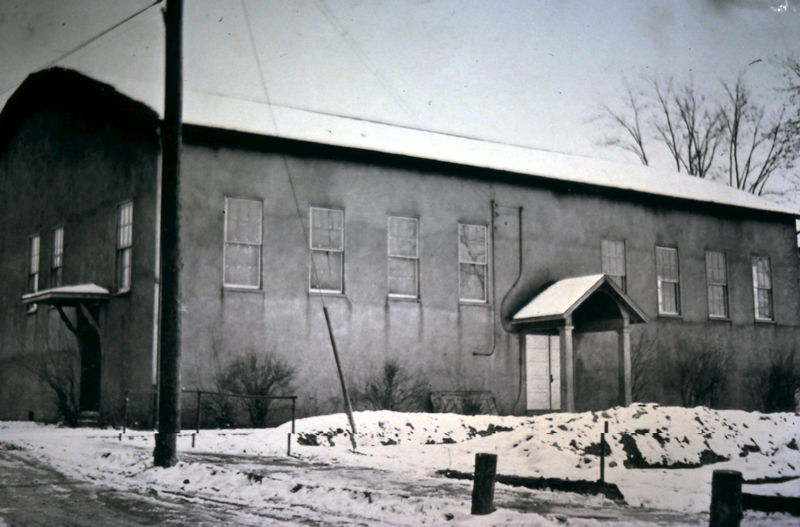
As the Sanders children grew, each learned to play one or more instruments, and the Sanders Family Orchestra was formed. They were called on to perform in numerous places both in and outside the county.
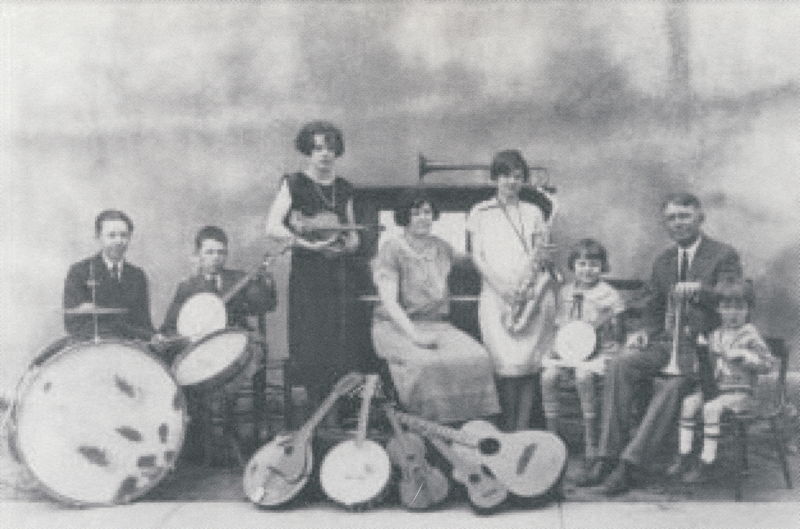
While there was little that Jack Sanders couldn't do if he set his mind to it, he quickly discovered that he didn't like driving automobiles. Toward the end of his time in Shepherdsville, the citizens presented him with a new Model T Ford. He drove it one time, hit a telephone pole, and never drove it again. Maggie Sanders took over as driver and the Model T was family transportation for the next ten years.
After the 28-29 school year, Jack Sanders resigned as principal to the great disappointment of the community. He finished his college work at Western Kentucky, and then accepted a new job in Greensburg where he once again worked his "magic," as he had done in Shepherdsville.
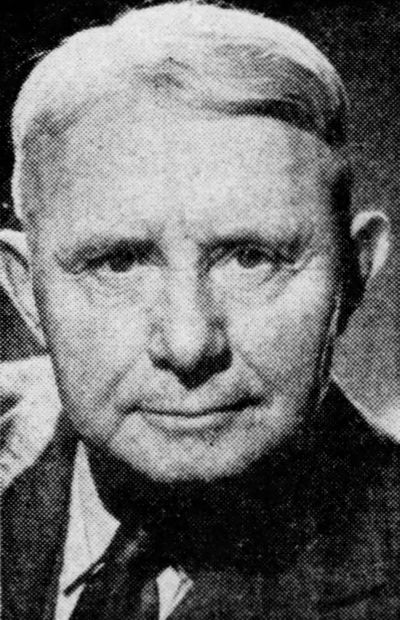
In 1945, a newspaper printed the following about Jack Sanders' time at Greensburg.
Fifteen years ago, Green County, Kentucky, had no paved roads. Greensburg, its only town, had no paved streets, no city lights, no water system. That is all changed now; and the dauntless spirit of J. H. "Jack" Sanders, principal of the 12-grade school, has been the force behind this change. Sanders sold high school education to Green Countians. He sparked the desires and was the driving force behind improvements such as a community cannery, four major paved roads through the country, a thriving town in which vacant lots and houses are at a premium, a town with broad pavements, lights, water!
In that 1941 article we mentioned at the beginning, we learned a bit more about that Jack Sanders magic.
Each fall Professor Jack and Mrs. Sanders complete their annual educational round-up of Green County. From Chinquapin to Black Gnat they visit the rural outposts. For ten years such programs have been held with the result that today, of the approximately 300 students at the Greensburg High School, 200 come from the rural sections although no transportation is provided.
Most credit for this is because of the personal contact which Mr. Sanders has developed with Green County farmers. He knows their first names and their children's names.
At these round-up meetings, Mr. Sanders, an expert banjo player, and his wife, equally good with the accordion, strike it up with everything from "She'll Be Comin' 'Round the Mountain" to the latest song hits. Then Mr. Sanders, an excellent orator, goes into action, as he explains the value of a good education.
It seems that in Greensburg, like Shepherdsville before, Jack Sanders' enthusiasm was infectious. People listened to his message, and believed in what he said; mainly, I think, because he so whole heartedly believed it himself.
Jack Sanders remained in Greensburg until 1948 when he retired at the age of 67, and he and Maggie moved to Greenville to be near their daughter, Margaret. He didn't remain "retired" long, and was soon substitute teaching in the Greenville school, and teaching men's Bible class at the local Baptist Church.
Their six children deserve some mention. Margaret, the eldest, became a band director and music teacher in the Greenville schools. Bill moved to North Carolina where he owned tobacco warehouses, and had a knack for calculating in his head the price of baskets of tobacco. Lois played basketball in high school. She was an accomplished musician, and taught school in Jefferson County. Bob was also an educator, and was assistant superintendent of Louisville Schools when he retired. At the time of this writing, Elizabeth, or Liz, was an accomplished professional pianist who lived in Michigan. Tom joined the air force in World War II, flying 31 missions over Japan. Following the service, he became a dentist in Louisville. He also prepared the family genealogy that has proven so helpful in my research.
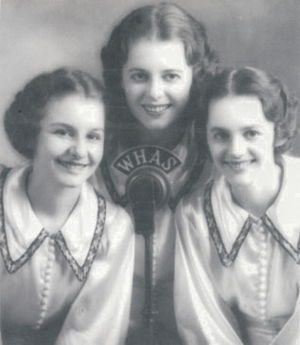
The three Sanders sisters performed as a trio on WHAS radio during the 1930's, both singing and playing instruments. When Liz left for college, the other two teamed up with Dale Evans, calling themselves the "Novelty Girls" for a short time.
In 1966, on a visit to Shepherdsville, Jack was interviewed for the local paper. When asked about substitute teaching at the age of 85, he replied, "When a man grows old, he must have something to occupy his time or he'll stagnate mentally and physically. That's why the opportunity to fill in occasionally as a substitute teacher has been good for me."
Although he was called upon to teach just about every subject, he was basically a mathematician. In the interview he mused, "I don't care what I start out on, it comes out math. One day in class a boy asked me how old I am. 'I'm an octogenarian,' I replied. 'What do you think that is?' 'I think,' the boy replied, 'that's some kind of prehistoric animal.' You know, he may have been right."
Maggie Sanders died in 1957. Jack lived 91 years, passing in 1973. Their lives, and those of their family have blessed people across Kentucky.
Even today, ask old-timers in Shepherdsville, Greensburg, or Greenville about Prof. Sanders and watch them smile at the memories.
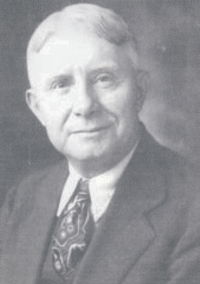
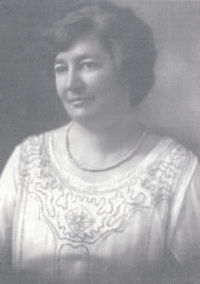
Photos of the Sanders Family are taken by permission from The Sanders of Saloma by Tom E. Sanders, D.M.D., son of Jack and Maggie Sanders.
Copyright 2019 by Charles Hartley, Shepherdsville KY. All rights are reserved. No part of the content of this page may be included in any format in any place without the written permission of the copyright holder.
The Bullitt County History Museum, a service of the Bullitt County Genealogical Society, is located in the county courthouse at 300 South Buckman Street (Highway 61) in Shepherdsville, Kentucky. The museum, along with its research room, is open 10 a.m. to 4 p.m. Monday through Friday. Saturday appointments are available by calling 502-921-0161 during our regular weekday hours. Admission is free. The museum, as part of the Bullitt County Genealogical Society, is a 501(c)3 tax exempt organization and is classified as a 509(a)2 public charity. Contributions and bequests are deductible under section 2055, 2106, or 2522 of the Internal Revenue Code. Page last modified: 12 Sep 2024 . Page URL: bullittcountyhistory.org/memories/sanders.html